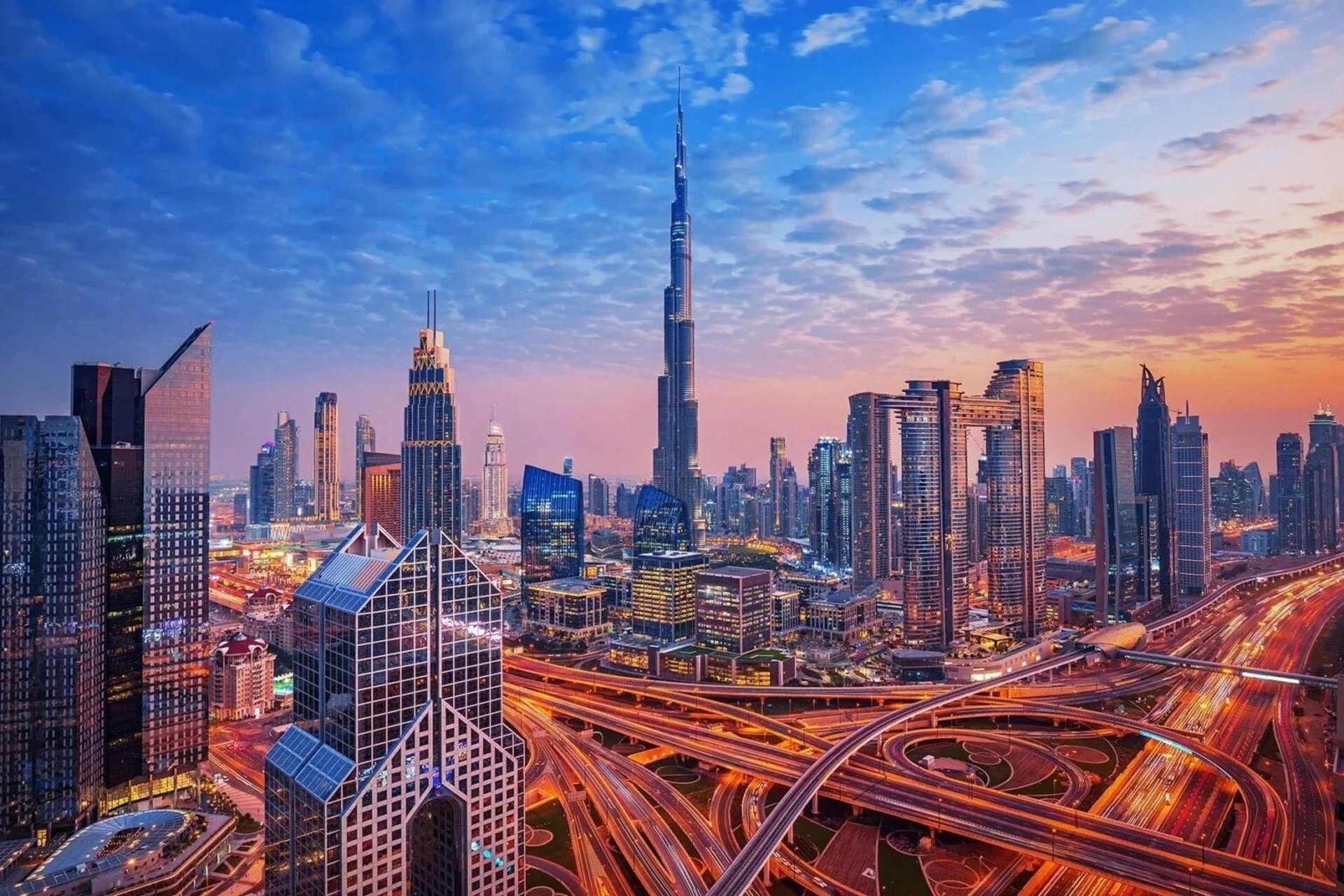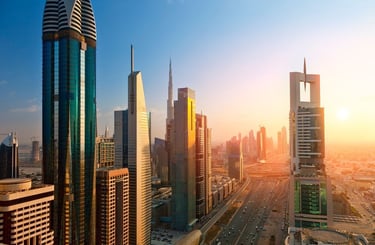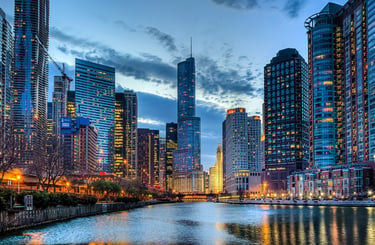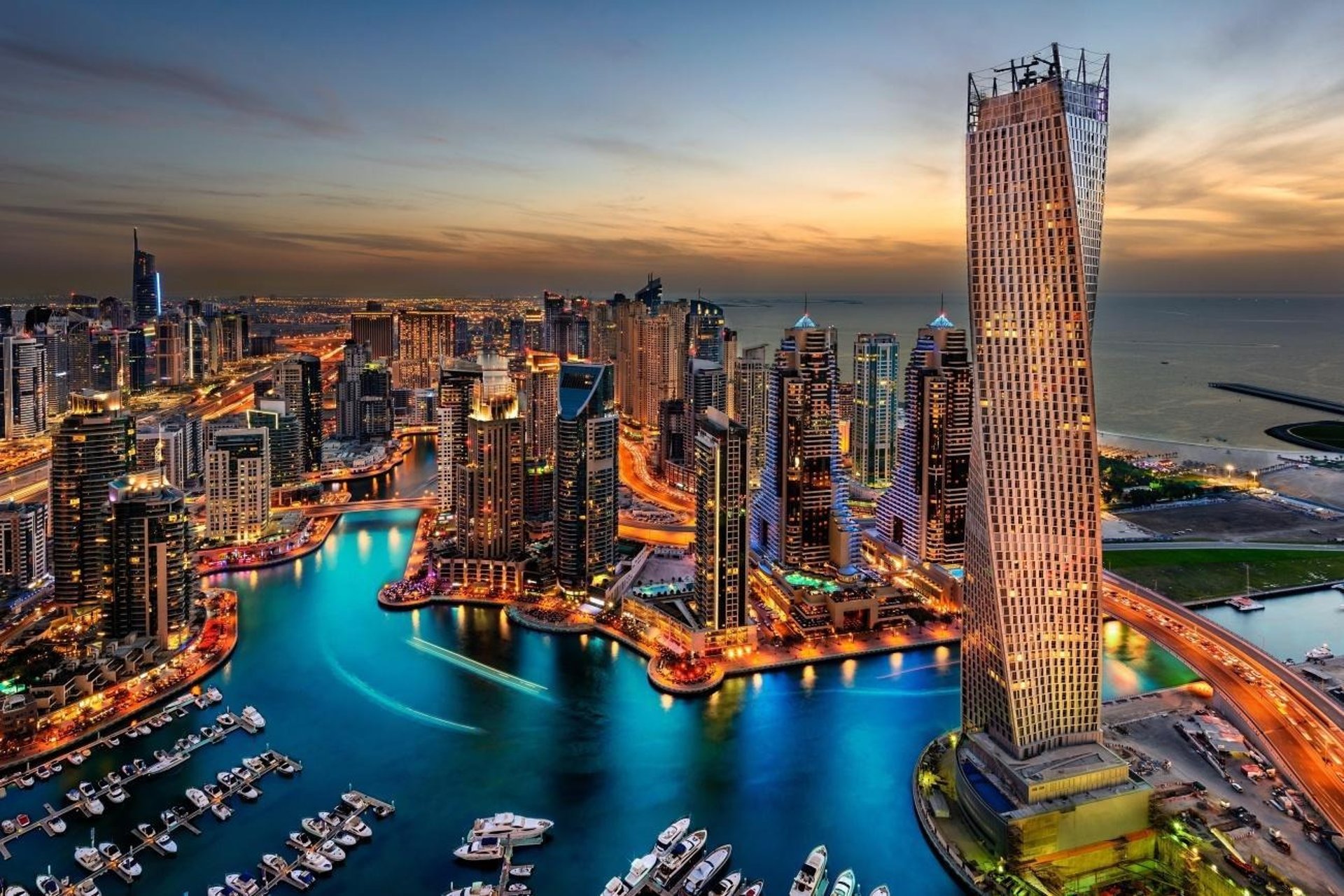
About UAE
The United Arab Emirates (UAE) is a federation of seven emirates located on the southeastern coast of the Arabian Peninsula. It was formed in 1971 and includes Abu Dhabi (the capital), Dubai, Sharjah, Ajman, Umm Al-Quwain, Fujairah and Ras Al Khaimah.
United Arab Emirates (UAE)
History
The history of the United Arab Emirates (UAE) is rich and deeply rooted in the region’s tribal culture, trade, and Islamic heritage.
Ancient History (Pre-600s AD)
i) Archaeological discoveries indicate human settlement in the region as early as 125,000 BCE.
ii) Bronze Age (3,200–1,300 BCE): The area was part of the Umm Al-Nar and Wadi Suq civilizations, engaged in copper mining and trade.
iii) Iron Age (1,300–300 BCE): The region developed underground irrigation systems (falaj), enabling agriculture.
Islamic Era & Early Trade
(600s–1500s)
i) Islam spread to the UAE in the 7th century AD, and the area became part of the Islamic Caliphate.
ii) The coastal cities became key stops for traders traveling between India, Persia, and Africa.
Portuguese & British Influence (1500s–1800s)
i) 1500s: The Portuguese arrived and controlled key trade routes.
ii) 1700s: Local Arab tribes resisted European influence. The Qawasim naval power controlled parts of the Gulf.
iii) 1800s: The British, seeking to protect their India trade routes, clashed with local tribes, labeling them as "pirates" and leading to the General Maritime Treaty of 1820. This made the region a British protectorate.
Trucial States & Oil Discovery (1800s–1960s)
i) The emirates were known as the Trucial States, governed by local sheikhs under British protection.
ii) Oil was discovered in the 1950s and 1960s, leading to rapid economic and social changes.
Formation of the UAE (1971)
i) On December 2, 1971, six emirates (Abu Dhabi, Dubai, Sharjah, Ajman, Umm Al-Quwain, Fujairah) united to form the United Arab Emirates. Ras Al Khaimah joined in 1972.
ii) Sheikh Zayed bin Sultan Al Nahyan, the ruler of Abu Dhabi, became the first president.
Modern UAE (1971–Present)
i) The UAE transformed from a small trading and fishing economy to a global economic hub.
ii) Diversification efforts in tourism, aviation, and finance reduced reliance on oil.
iii) The country hosted major events like Expo 2020 Dubai and became a space exploration leader with the Hope Mars Mission (2021).






Economy
The UAE has one of the most dynamic and diversified economies in the Middle East. While it was historically reliant on oil, the country has made significant progress in diversifying its economy, with major contributions from sectors like tourism, trade, finance, and technology.
1. Key Economic Sectors
i) Oil & Gas: Still a major contributor, but its share in GDP has decreased as the country diversifies.
ii) Tourism & Hospitality: Dubai and Abu Dhabi attract millions of visitors yearly, with landmarks like the Burj Khalifa and the Louvre Abu Dhabi.
iii) Real Estate & Construction: Mega-projects such as The Palm Islands and Expo 2020 have fueled growth.
iv) Financial Services: Dubai International Financial Centre (DIFC) is a major hub for banking and investment.
v) Trade & Logistics: The UAE is a key trade hub with Jebel Ali Port and Dubai International Airport being global logistics centers.
vi) Technology & AI: The UAE is investing heavily in AI, fintech, and digital transformation.
2. GDP & Growth
i) The UAE’s GDP is around $500 billion, making it one of the largest in the region.
ii) The economy is expected to grow at 3-4% per year, driven by non-oil sectors.
3. Economic Vision & Diversification
i) UAE Vision 2030 & 2050: Plans to reduce reliance on oil and focus on innovation, sustainability, and knowledge-based industries.
ii) Green Economy Initiatives: Investment in renewable energy, including the Mohammed bin Rashid Solar Park.
iii) Free Zones: Dubai and Abu Dhabi have many free zones attracting foreign investment with tax benefits.
4. Challenges
i) Global Economic Slowdowns: Fluctuations in oil prices still have some impact.
ii) Geopolitical Risks: Regional tensions can affect investor confidence.
iii) Sustainability Goals: Transitioning to a greener economy while maintaining rapid development.



Offshore Jurisdiction
The UAE offers several offshore company jurisdictions that allow foreign businesses to register and operate in the region with various benefits such as tax exemptions, privacy, and minimal reporting requirements.
Key Features of UAE Offshore Jurisdiction
2. Jebel Ali Free Zone (JAFZA)
i) Located in Dubai, it’s one of the oldest and most popular free zones.
ii) Known for offering 100% foreign ownership, tax exemptions, and easy access to the UAE market.
iii) Suitable for companies looking for warehousing, distribution, and logistics.
1. Mainland (Onshore) Companies
i) Companies set up on the mainland of the UAE are governed by the UAE Commercial Companies Law (CCL). Mainland companies are regulated by the Department of Economic Development (DED) in the respective emirate, such as Dubai, Abu Dhabi, or Sharjah.
ii) Mainland companies can operate anywhere in the UAE, including within the local market.
iii) Jurisdiction: Local government and federal laws govern these companies.
3. Ras Al Khaimah International Corporate Centre (RAK ICC)
i) Located in Ras Al Khaimah, it offers cost-effective offshore company registration.
ii) Provides 100% foreign ownership and no tax on corporate profits.
iii) RAK ICC is known for ease of setup and privacy, making it ideal for holding companies, investment firms, and asset protection.
4. Ajman Offshore
i) Offers affordable registration fees and straightforward setup.
ii) Provides similar advantages such as 100% foreign ownership, tax exemptions, and privacy.
iii) Great for businesses that don’t require a physical office or full operations within the UAE.
5. Umm Al Quwain Free Trade Zone (UAQ FTZ)
i) Located in Umm Al Quwain, it offers competitive pricing and various incentives like tax exemptions and 100% foreign ownership.
ii) Ideal for small businesses or those seeking a low-cost option for offshore incorporation.
6. Dubai Offshore
i) Registered in one of the Dubai-based offshore jurisdictions (e.g., Dubai International Financial Centre).
ii) More suited for international companies involved in holding, investments, and managing assets.
Key Benefits of UAE Offshore Companies
1) Tax Exemption
No income tax, capital gains tax, or corporate tax.
2) Asset Protection
Offshore companies offer high levels of privacy and asset protection.
3) No Currency Restrictions
Companies can easily transfer funds across borders without restrictions.
4) Full Foreign Ownership
100% foreign ownership without the need for a local sponsor.
5) No Physical Office Requirement
You don’t necessarily need physical presence to open a company in the UAE. Many Free Zones and even some Mainland company setups allow remote registration.
Key Benefits of UAE Offshore Companies


All Rights Reserved © 2025
Address
44, Boulevard Victoria Avenue,
Port-Louis, 11403, Mauritius
Contacts
Tel 1: (+230) 5444 6695
Tel 2: (+230) 5780 2621
Email: info@worldfinconsult.com
AAll Rights Reserved © 2025
Quick Links


